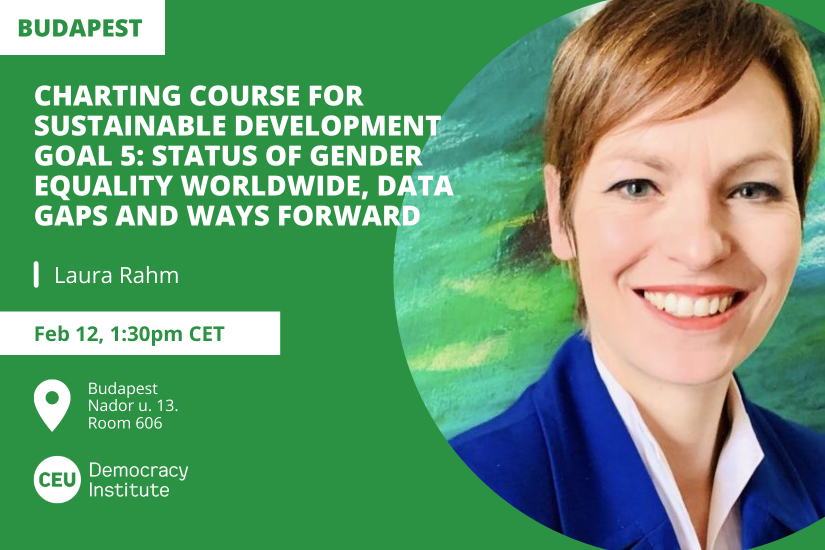
The Inequalities and Democracy Workgroup of the CEU Democracy Institute cordially invites you to its public seminar.
If you would like to attend, please register here.
Please keep in mind that external guests will not be able to enter the building without prior registration.
The seminar starts with a 25-minute presentation of the research followed by the comments of the discussant. Then the floor will be open for participants to ask questions and discuss the research. To be able to actively take part in the discussion, please read the draft paper beforehand which is available upon request from the author.
Abstract:
The latest SDG 5 data indicate that the world is not on track to achieve gender equality by 2030. Overlapping crises, including conflict, climate change, COVID-19 and the backlash against women’s sexual and reproductive health and rights further diminish the outlook for gender equality. Meanwhile, issues with data availability persist: while important initiatives are ongoing to increase the collection of sex-disaggregated data at the country level, only 47 per cent of data required to track progress on SDG 5 is available. This chapter reviews the progress and setbacks towards achieving SDG 5 since 2015. It presents current evidence and data gaps on gender equality across all 17 goals from a gender perspective. It assesses the debates around what types of data are needed to identify and address gender inequalities. Lastly, it offers implications for research and practice on how to strengthen multi-stakeholder partnerships and data, monitoring, and accountability (SDG 17) to advance SDG 5 and the 2030 Agenda for Sustainable Development.
Speaker:
Laura Rahm, Ph.D., is a Marie Sklodowska-Curie Research Fellow at the Democracy Institute of the Central European University. She received her Ph.D. in Political Sociology and Demography from the Sorbonne University, Paris. She is also an Associate Researcher at the Paris-based Center for Population and Development and a Fellow at the School of Transnational Governance at the European University Institute, the Munk School of Global Affairs and Public Policy, and the Sociology Department of the University of Toronto. She recently completed a Postdoctoral Fellowship at the University of Barcelona for an ERC-funded research project.
Discussant:
Vera Messing is a research fellow at the Center for Policy Studies as well as a senior research associate of Center for Social Sciences and a research fellow at the Inequalities and Democracy and De-and Re-Democratization workgroups of the Democracy Institute. She earned her PhD in Sociology at Budapest Corvinus University in 2000. Her work focuses on comparative understanding of different forms and intersections of social inequalities and ethnicity and their consequences. She is specifically interested in policy and civil responses to ethnic diversity in the field of education and labour market; migration and migrant integration; attitudes towards racialized minorities and immigrants; media representation of racialized groups and conflicts; social science methodology and measurement of social phenomena.